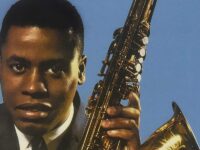NICK DERISO: Art Blakey demanded bravado from his bands, and this one was perhaps his most intense and adventurous.
Debuting here on Riverside, “Caravan” opens with Blakey’s audacious drum solo — then moves quickly into an assertive and simply awe-inspiring take on a track once defined by Duke Ellington. A muscular trio of trumpeter Freddie Hubbard, bone player Curtis Fuller and saxophonist Wayne Shorter — swelling the Jazz Messengers to sextet status for the first time ever — clear the way for a impish signature by pianist Cedar Walton, then encircle the tune in ways both inventive and familiar.
If this album ended at the 9:44 mark, when “Caravan” concludes, it would still be one for the ages. But they were just getting started, quite literally.
Shorter, by then the veteran of the group, completely inhabits that role, offering new compositions in “Sweet n’ Sour” and the harmonically challenging “This is for Albert” that anchor both sides of this record. A surprise among two other cover tunes is “In the Wee Small Hours of the Morning,” which softens the familiar, driving Blakey sound with a touch of welcome romanticism — courtesy of Fuller’s warm and inviting work on the trombone.
Leave it to Hubbard to finish things on an appropriate note — burning down the house on the set closing, and appropriately named, “Thermo.”
Blakey, who was all about thermo, helped shape the 1950s reaction to the languid and occasionally featureless West Coast jazz — something Miles Davis launched with “Birth of the Cool,” then almost immediately distanced himself from as it began to become both pervasive and then moribund.
Hard bop, with Blakey as its champion, steered the music back into its African root system — as did the subsequent, far more commercial soul jazz movement. Both had, at their center, a basis in the blues, best heard on the records of soul jazz stars like Jimmy Smith and Julian “Cannonball” Adderley. Hard bop took the blues, though, and built a entirely different structure on top of it.
Blakey walked the walk, spending time during this period in West Africa, and taking the indiginous name of “Abdullah Ibn Buhaina” — later more commonly shortened, simply, to “Bu.”
But his fierce, uncompromising records only heralded a flying-leap period of experimentation by jazz musicians that went even further away from European musical traditions in the latter half of the 1960s — a no-chords/no-compass approach personified by the sheets-of-sound recordings by John Coltrane, and mirroring the flights of fancy by signature pop artists of the day like the Beatles.
But before that came this period of sharp-witted, still vibrant recordings by guys like Blakey — a loving, if aggressive, look back into the roots of black music.
The exit of Lee Morgan, followed by the quick introduction and steady maturation of Hubbard and Fuller, confirmed Blakey’s place — even then — as one of the top finishing schools for young jazz minds. It’s a role he would play into the 1980s, with final lineups that featured Wynton and Branford Marsalis, and then Terence Blanchard and Donald Harrison.
Bassist Reggie Workman appears for the first time with the Jazz Messengers here, but it’s Walton who takes this album to places — notably on the extended title piece — that the departed Bobby Timmons couldn’t have dreamed. Blakey found a way, even on transitional albums, to improve.
They’re still discovering their true voices, but yet also finding ways to dazzle. “Mosaic,” which preceeded this one in 1961, and the subsequent 1964 album “Free For All,” both on Blue Note, are similar, nearly perfect polyrhythmic gems.
A high-water period for a band that had many.
Original producer Orrin Keepnews, who has supervised a new reissue of “Caravan,” also included alternate takes on both “Thermo” and “Sweet ‘n’ Sour.”
- How Deep Cuts on ‘Music From Big Pink’ Underscore the Band’s Triumph - July 31, 2023
- How ‘Islands’ Signaled the Sad End of the Band’s Five-Man Edition - March 15, 2022
- The Band’s ‘Christmas Must Be Tonight’ Remains an Unjustly Overlooked Holiday Classic - December 25, 2016



